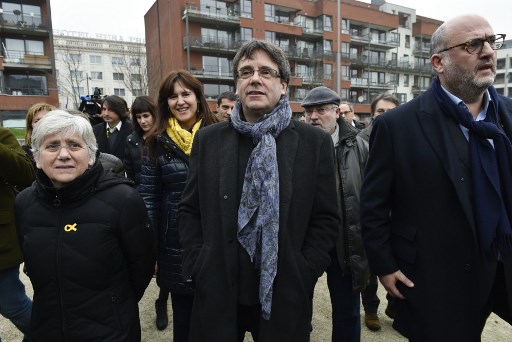
BARCELONA, Spain – Catalonia’s parliament met Wednesday for the first time since it was dissolved following a failed bid to break from Spain in a session that will see separatists start the process to get sacked regional leader Carles Puigdemont back into power.
Pro-independence parties are in the majority after winning regional elections on December 21 called by Prime Minister Mariano Rajoy to try and put an end to a secession crisis that shook the region of 7.5 million people, Spain and Europe.
With 70 out of 135 deputies, they should in theory have the necessary votes to nominate a separatist president.
Their favored candidate is Puigdemont, sacked by Rajoy along with his cabinet on October 27 after the regional parliament declared unilateral independence, and who is in self-imposed exile in Belgium.
Late on Tuesday, the two largest pro-independence parties said they had agreed to nominate him as their candidate.
The new parliament opened at 11:00 am (1000 GMT) and lawmakers will vote for a new parliamentary speaker and his or her deputies.
Separatists will attempt to get a majority of their supporters elected to these key positions as they will subsequently decide whether Puigdemont and others are allowed to be lawmakers remotely.
But their majority remains theoretical, with three of the 70 deputies being held in prison as they are probed for rebellion, sedition and misuse of public funds for their role in the failed independence bid.
Five others are abroad, including Puidgemont who risks arrest on the same charges if he comes back to Spain.
Sworn in via videolink?
To be elected president, he should in theory be present at the parliamentary session where the vote to name a new leader takes place, but he wants to appear by videolink or write a speech and have it read by someone else.
The Catalan parliament’s rules stipulate that the candidate for the regional presidency must “present his or her government programme to parliament.”
It does not detail whether this must be done in person, but several legal experts, the opposition and the central government insist it cannot be done remotely.
Rajoy’s government has warned Madrid will maintain direct control over Catalonia if Puigdemont attempts to govern from Belgium.
Madrid’s direct rule has proven very unpopular in a region that had enjoyed considerable autonomy before its leaders attempted to break away from Spain.
According to Economy Minister Luis de Guindos, the secession crisis that kicked off on October 1 when Catalan leaders held an independence referendum despite a court ban has taken its financial toll.
He has said the crisis has slowed economic growth in the region at an estimated cost of one billion euros ($1.2 billion).
More than 3,000 companies have moved their legal headquarters out of the region as uncertainty persists.








